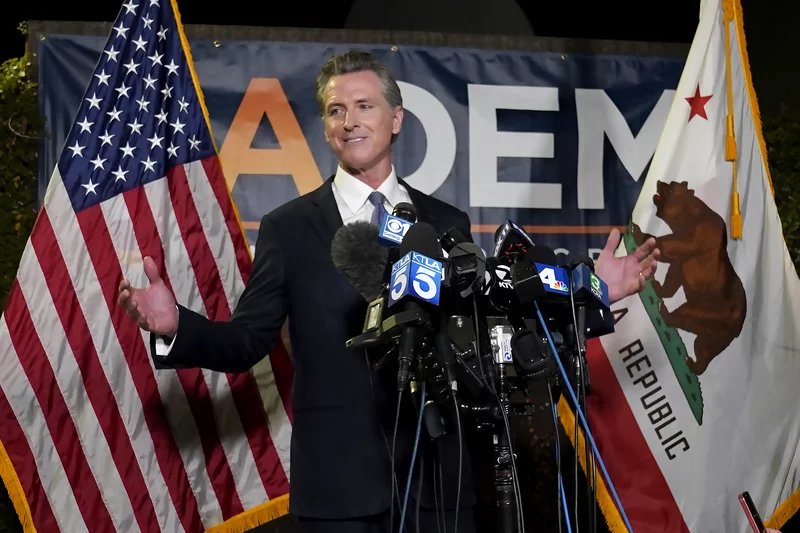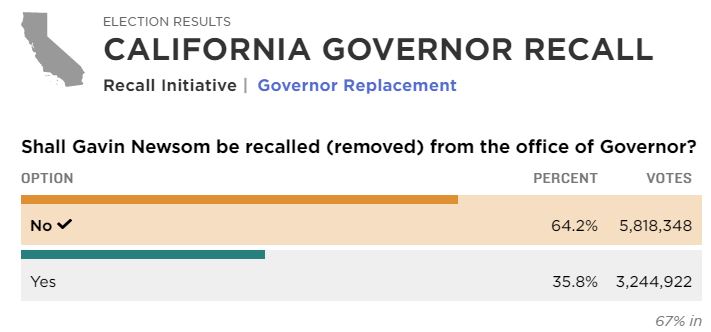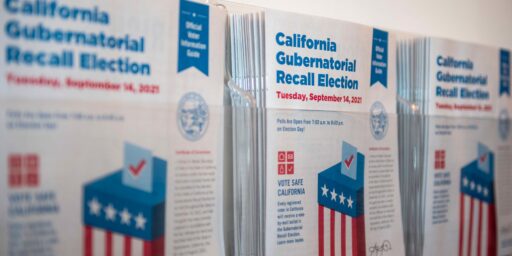Newsom Easily Survives Recall
The flake beat the weirdo.

While it looked like California Governor Gavin Newsom might be recalled and replaced by conservative talk show host Larry Elder as recently as a month ago, it looks like voters chose nearly two to one to stick with the devil they knew.

NPR (“Gov. Newsom Keeps His Seat After A Majority Of California Voters Reject The Recall“):
The attempt to recall California Democratic Gov. Gavin Newsom has failed, according to a call by the Associated Press, allowing the governor to stay in office until at least 2023.
Tuesday ends a campaign against Newsom that began before the coronavirus pandemic took hold in the U.S.
“I am humbled and grateful to the millions and millions of Californians that exercised their fundamental right to vote,” Newsom said Tuesday night, speaking, almost somberly, to a group of reporters. “We [have] so much more in common in our state than we give ourselves credit for,” he added, expressing how difficult life has been for Californians during the pandemic.
The governor’s victory serves to vindicate his leadership of the state through COVID-19, but he won’t be off the campaign trail for long. He’ll have to run for reelection next year if he wants to keep his seat after his term ends.
This recall petition was one of six circulated by the governor’s opponents to remove him since he took office in January 2019.
Getting the vote to the ballot took an unlikely synchronization of political fortune and Newsom’s own missteps. Last year, a judge gave the recall campaign an additional four months to collect signatures, citing the difficulties in distributing petitions during the pandemic. Later that day, Newsom dined at the upscale French Laundry restaurant in Napa Valley, ignoring his own guidance to avoid gatherings as the spread of the coronavirus picked up.
The dinner became the enduring symbol of the recall campaign and fodder for the most convincing attack against the governor: that he failed to practice what he preached.
Instead of waiting for the 2022 gubernatorial election, thousands of the governor’s detractors signed petitions to put Newsom’s fate on the ballot this year.
The resurgence of the virus also allowed Newsom to draw his clearest contrast between the candidates hoping to replace him, most notably conservative radio talk show host Larry Elder, who conceded the race late Tuesday local time.
Ultimately, the vote wasn’t so much an endorsement of Newsom but a rejection of Elder. Understandably, a rather progressive state preferred to keep a hypocritical liberal Democrat rather than be governed by a pro-Trump, conspiracy theorist.
Newsom announced in late July vaccine mandates for California state employees, health care workers and school staff, along with a mask requirement for school children — orders that Elder promised to revoke on day one if elected.
But Elder’s emergence as the clear favorite on the ballot’s second question — who should replace Newsom if he’s recalled? — allowed the governor to turn the race from a referendum into a choice. The governor spent the final days of the campaign slamming Elder’s conservative positions on climate policy, abortion and minimum wage.
Elder has been a vocal supporter of former President Trump and, in response, Democrats linked the recall effort to Trumpism and to the national Republican agenda on issues like reproductive rights and voting access.
Elder, like the former president, has claimed, without any evidence, that Trump lost last year’s election to election fraud. “There are all sort of reasons the 2020 election, in my opinion, was full of shenanigans,” Elder said earlier this month. “And my fear is they’re going to try that in this election in the recall.”
Whether allowing a tiny minority of citizens to force a recall of a governor or other elected officials is a good idea is debatable. But California’s system, wherein a recalled politician is replaced by the plurality winner, regardless of how few votes they received, is nuts. They should certainly reform it if they want to keep it.




Pundits are painting this as a loss for Trumpism rather than a win for Newsom. To the extent that is true, it gives me hope for next year’s elections. In many states a non-Trumper Republican cannot win the primary. Hopefully this is a sign that a Trumpist primary winner won’t be able to win the election in a few key states.
I’d draw the following lessons:
(1) Regardless of candidates or circumstances, Cali is a lot bluer in 2021 than it was in 2003.
(2) Larry Elder is no Ah-nold.
(3) Caitlyn Jenner is no Ah-nold.
(4) I think it’s safe to say that Dems have learned the lessons of complacency by now–not just from 2016, but from off-year upsets like Scott Brown in early 2010. Now they get off their butts when they need to.
Looking a little at the history of recall elections, Newsom may have scored the strongest showing ever for an incumbent in a recall election. I know for a fact that’s the case for gubernatorial recalls, though that’s not saying much as this was only the fourth gubernatorial recall election in American history–after Scott Walker in 2012, Grey Davis in 2003, and one in North Dakota in the 1920s. Newsom is the only governor besides Walker to survive a recall.
There have been a smattering of recalls for other offices over the past century, and one of them (I didn’t know this until looking it up just now) was Dennis Kucinich who survived a mayoral recall in 1978 by just 236 votes. The same Kucinich who just lost the primary last night to return to that office. Funny how that works.
Oh, and one final thing….
This is great news for Arnold Vinick.
A $300 million tantrum. No wonder we can’t have nice things.
@MarkedMan:
That would be nice. Especially because the fact that Elder, a crazy talk show host, became the de facto nominee over the sane and electable Mayor of San Diego indicates that the GOP isn’t going to be nominating many non-Trumpists.
@SKI:
You’d think it ought to given how much Newsom appeared to be helped by Elder becoming the public face of the recall effort. That’s just never how it’s happened over the past decade: whether they lose with a crazy or win with a crazy, their response is always to double down. Typically they refuse to even accept that they hurt their chances of winning by nominating (or in this case rallying around) a crazy, but it’s also part of a long-term strategy where they lose a battle while winning the war.
@Kylopod: Reminds me of the old saw: “sure, we’re losing money on every sale, but we’ll make up for it with volume!”
@Kylopod:
This is why I point to California whenever someone talks about what the “Republican Party must do” or “once the Republicans see how bad things are they will change”. I hate to use engineering examples but this one is so appropriate: the California Republicans adjusted to system inputs and kept operating relatively efficiently for decades, but in the past 20 years or so they entered a runaway feedback loop and none of the normal corrections were enough to dampen it. It took a good number of election cycles for it to become apparent to all, but by now the reality is plain – the California Republican party is too outside the control parameters and aren’t coming back.
The only way I see a Party calling itself the Republican Party coming to power again there is if the current party becomes so small and ineffective that it represents a takeover target, and another group seizes control and strips it for parts. It won’t be a reform from within, but rather some other group hijacking a brand name and legal structure and whatever money is left and releasing a different product.
@OzarkHillbilly: This waste of state funds pisses this Californian off no end.
I am not used to being correct when it comes at the expense of polls. Polls, after all, are empirical data, and a lifetime of working in STEM has taught me to respect data.
How did the polls get this so wrong? I mean, yeah, they were showing things trending against the recall but I never saw anything that was 2-1 against. And yet that’s how CA voted both for Gov and Pres last cycle.
@Jay L Gischer: I don’t think polling is very useful for nonstandard elections like this one. The fact that people have been voting for weeks means it’s a constantly moving target. And I think it only very recently became obvious to most voters, who don’t pay much attention, just how bonkers Larry Elders is.
I am not a quant type guy so I will not get into the weeds regarding the polls, but CA is not TX or FL, we just are not. The actions by the Governors of those states rightfully spooked Californians (and certainly did not help Elder’s push to become Governor). My understanding is that FL is now trying to roll back reproductive rights (perhaps less damaging to the female populace as a whole when many of your citizens are well past the Menopause stage of life, but still highly problematic), and stuff like this just furthers the belief that TX and FL are acting more and more like Rogue States as the days wear on.
As it has been pointed out a jillion times, CA was once a solidly GOP state and you know what this liberal had no issues with that fact (at least I was not looking over my shoulder that the GOP was going to take away my right to vote because I am a “liberal,” and I was not as stressed when the GOP was in power that my nieces agency to control their own bodies was going to end up in the hands of our next Governor, which gives a lot of people the shivers up and down their spine).
If anything, the GOP will not admit it out loud, but they have to privately admit that yesterday’s results show that they need to stop embracing the crazy. The GOP has to stop listening to Fox news pundits that a grand political takeover of CA is right around the corner, it just is not, it really is not…nearly 2 out of 3 voters wanting to keep CA under the stewardship of a Democratic Governor is proof of that.
Anyone on the GOP side who wants to scream voter fraud today when nearly 2/3rds of the vote broke for Newsom will just come off sounding like the ultimate sore loser.
The task now is to reform the recall process.
I’m in favor of the option to recall any elected official, and in fact wouldn’t mind having a presidential recall election option. But there should be a basis for recall more serious than “I don’t like the guy,” and the succession mechanisms in place ought to remain in place.
The latter is easy. If the state law/constitution provides the lieutenant governor succeed the governor in case of death, disability, impeachment, etc., it should also be valid in case of a recall.
The former is tricky. A sidestep would be to require many more signatures on a recall petition, so there will be a broad base of support for the measure. And these should be distributed among all counties on a prorated basis. Say a threshold of 25% of the votes cast in the last election is the threshold, then that means at lest 25% in every county, not in all of them added together.
The goal is to keep recall possible but not frivolous (ie not on a “we don’t like the guy” basis).
A presidential recall should work along the same lines, but with the result counting only the popular vote. IMO, trump would have been out before 2018 under such a system.
@James Joyner:
Jay. You weren’t paying attention. Last few polls had it around 60-40. And the trend had Newsom’s lead expanding.
https://projects.fivethirtyeight.com/california-recall-polls/
https://www.suffolk.edu/-/media/suffolk/documents/academics/research-at-suffolk/%20suprc/polls/other-states/2021/%209_8_2021_ca_statewide_marginals_a_pdftxt.pdf
@EddieInCA: @Jay L Gischer:
Sorry, Dr. Joyner. That was for Jay.
https://twitter.com/KennethNorville/status/1437993815348891649
@Jay L Gischer:
Furthermore, in both 2018 and 2020, California polls were among the most accurate.
@EddieInCA:
I have two critiques:
1) The first link shows polling at 57% No. The result was 64% No. Polls are supposed to be more accurate than that, you know, +- 3%
2) The polling trend shown on 538 shows huge movement between early August and now. I dispute this. I went on record back then in this space saying I thought that was off. That huge movement is due to the “likely voter” screen, I expect. But that’s a place that isn’t quite empirical.
And to James.
Every election in California is conducted mostly by mail these days. Maybe not as much as the last two, but to a great extent. Few in the state have a problem with this. There is a much more solid audit trail, and local officials can text you that they got your vote, which gives everyone confidence.
The polls in the previous recall were pretty accurate. So, this is a new landscape for pollsters, for sure, but I’m more suspicious of the “likely voter” screen/model than I am inclined to point to factors such as the timing and logistics of the election.
Yeah, but they got FL very wrong in 2020, for instance. And a couple other states.
@Jay L Gischer: Why is the margin of error supposed to be +/- 3%?
@Kathy:
When I advocate for a parliamentary system of government in the U.S., the ability to vote no-confidence in the senior executive is #1 on my list of reasons why. Holding leaders accountable throughout their terms is something sorely missing from U.S. politics.